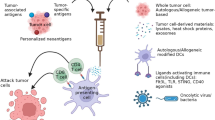Abstract.
An empirically established chemoimmunotherapy for metastatic melanoma combines the systemic administration of the chemotherapeutic agent dacarbazine (DTIC) with the epifocal application of the contact sensitizer 2,4-dinitrochlorobenzene (DNCB) on cutaneous metastases. Although this therapy yields high response rates resulting in prolonged survival, the mechanisms involved remain unknown. Here, we investigated whether treatment of tumor-bearing mice with DTIC and DNCB resulted in a specific immune response against the tumor. Subcutaneous (s.c.) tumors and lung metastases were induced in C57BL/6 mice by injecting syngeneic B16-melanoma cells s.c. or into the lateral tail vein, respectively. Mice were treated with intraperitoneal injections of DTIC followed by epifocal application of DNCB. This therapeutic approach significantly reduced the growth of s.c. tumors as well as lung metastases. Our data showed that the effector mechanisms involved are dependent on T cells. No therapeutic effect was observed in immunodeficient RAG-1-/- mice, or when the contact sensitizer DNCB was replaced by skin irritants (croton oil or tributyltin). Splenic lymphocytes obtained from treated mice displayed a three-fold higher specific cytolytic activity against B16 cells than in tumor-bearing controls. Both CD8+ and CD4+ T cells were able to lyse B16 cells. No changes were observed in natural killer (NK) cell activity. Likewise, tumor-infiltrating lymphocytes (TIL) of treated mice showed higher cytolytic activity than that of controls. Analysis of cytokine expression in s.c. tumors revealed increased mRNA levels of interferon-γ (IFN-γ), tumor necrosis factor-α (TNF-α), and interleukin-6 (IL-6) in treated tumors. Together, these findings demonstrate the ability of DTIC/DNCB treatment to induce an effective T cell-dependent host immune response against a syngeneic tumor.
Similar content being viewed by others
Author information
Authors and Affiliations
Additional information
Electronic Publication
Rights and permissions
About this article
Cite this article
Wack, C., Kirst, A., Becker, J.C. et al. Chemoimmunotherapy for melanoma with dacarbazine and 2,4-dinitrochlorobenzene elicits a specific T cell-dependent immune response. Cancer Immunol Immunother 51, 431–439 (2002). https://doi.org/10.1007/s00262-002-0292-4
Received:
Accepted:
Issue Date:
DOI: https://doi.org/10.1007/s00262-002-0292-4




